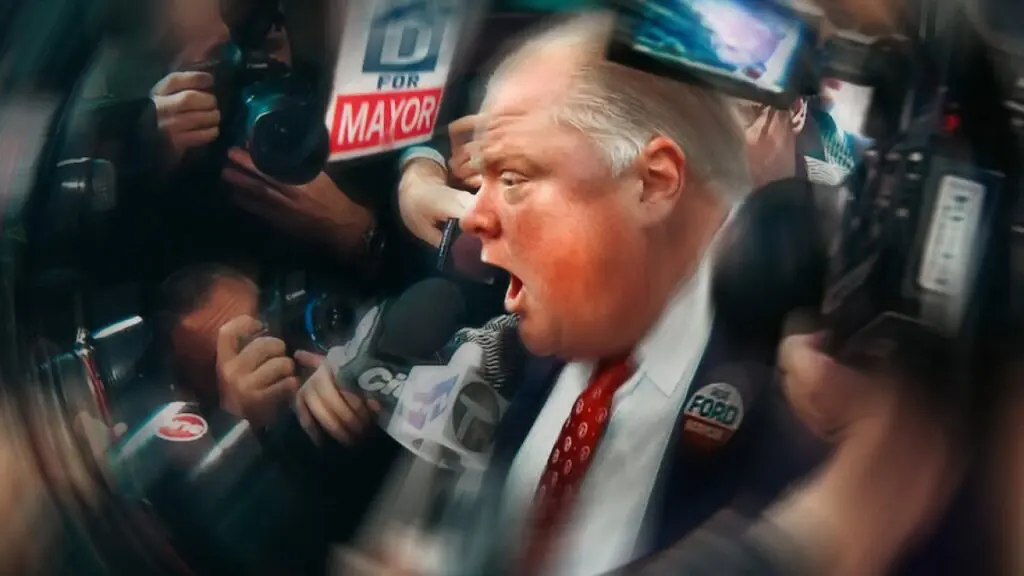
The comparison is so obvious, I might as well just lead with it. Everything about the chaotic mayoral tenure of Rob Ford, who is the subject of Trainwreck: Mayor of Mayhem, is interesting primarily in how it formed a kind of rubric for the political success of Donald Trump. Both are puffy-looking conservatives with confrontational, tough-guy attitudes. Both have been mired in scandal, though admittedly in distinct varieties. And both knew that the surest way to win over an electorate was to convince them that what they get up to personally is less morally contemptible than the snitches in the media who report on it.
With the benefit of hindsight, Ford’s run as mayor of Toronto from 2010 to 2014 feels startlingly familiar. He was elected on the strength of a riled-up blue-collar base and a few timely social media coups, then spent his time in office making rash policy decisions and wracking up a litany of private scandals, any one of which would, I suspect, have been enough to sink a candidate who lacked Ford’s non-threatening pallor and old money safety net. He lied about everything except the wildly politically incorrect things he’d often say and later unconvincingly apologise for. And he got away with it for a surprisingly long time, precisely because he vilified the press, framing their reporting of the news as deliberate and corrupt attempts to “take him down” out of fear of his popularity.
But there’s a surprisingly even-handed undercurrent to Mayor of Mayhem which seeks not only to highlight and poke fun at his controversies, including being caught on film smoking crack with gun-runners, but also to suggest through the testimony of more sympathetic associates that he was generally a good guy who wanted the best for his city but got completely carried away under the spotlight. His former head of security adds some context to a video of Ford drunkenly rambling in Patois, for instance, and his brother tells a story at his funeral – Ford died in 2016 of an aggressive and rare form of cancer – about him delivering a sandwich to strangers in the absence of a driver.

This is a nice anecdote, but you can tell the evidence in support of Ford’s greatness is pretty thin on the ground. This film – which, by the way, only runs for 48 minutes – isn’t as condemnatory as Trainwreck: The Astroworld Tragedy, and certainly not Titan: The OceanGate Disaster, but it’s clear that Ford is very much the butt of the joke, and that his career is being presented as a cautionary tale for how to spot someone abusing the system. A policy decision in which Ford declared transit workers as an emergency service so they couldn’t strike is mentioned, but only in passing, when that kind of thing is really the component most worthy of analysis. Ford’s addiction and uncouth commentary would be bad even if he was good at his job, but the fact his behaviour often dovetailed with him using his power for ill – we get a brief snippet of his capsule summary of why AIDs shouldn’t be a concern, but it’s divorced from the context of him voting against grant money for programmes that treat the disease – is unsatisfactorily examined.

A still from Trainwreck: Mayor of Mayhem | Image via Netflix
Addiction is likewise barely acknowledged, despite the fact that many of Ford’s outbursts and scandals were intimately tied to it. If it weren’t for privately-recorded video footage showing him strung out, the claims of his substance abuse would feel as inauthentic as he initially claimed they were (before later confessing, sort of apologising, and demanding everyone just move on from it.) There’s seems a tendency in 2025’s media output, even in fiction, to avoid tussling with this subject at all – Echo Valley on Apple TV+ is a really good addiction drama until it transforms into a dull thriller, and Mayor of Mayhem misses an opportunity to unpack the fascinating push-pull of a semi-functioning addict trying to navigate public office without the public or the media getting wind of what he was really up to.
Instead, this film seeks to provide an endless supply of schadenfreude in the hopes that audiences will delight in Ford’s spiralling downfall, when the real intrigue is in how, despite how many times he was caught red-handed, his popularity never really waned. The play-book seems so obvious that it’s hard to imagine how people couldn’t see through it at the time, but perhaps we’re living in a post-Trump reality where tactically-timed demonisation of the media, obvious deflection, and the cynical leveraging of victimhood – Ford was positioned sympathetically regarding his addiction and his cancer, perhaps justifiably in both cases – is only so clear in hindsight.
If nothing else, Trainwreck: Mayor of Mayhem highlights a clear mile marker on the long road to our current version of public office, which is indistinguishable from outright farce. Our – ostensibly democratically – elected leaders are celebrities and comedians, the fact-checking is done on X, usually incorrectly, and politics is in itself a form of warped entertainment. The schism that divides our culture is so wide that we can scarcely see each other across the chasm, let alone hear what the other side is saying. And yet we lap it up, so often enthusiastically, because the alternative is admitting what a mess we’re allowing to fester.


